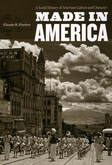 On December 5 we had a special presentation by Claude Fischer, sociology professor at UC Berkeley, about his book Made in America (2010, University of Chicago Press). The intent of the book is to chronicle the reality of America’s past based on the actual lives of its people, rather than in broad historical generalities. This was done by examining records that were written by or about those who dwelled in what now is the United States going back to colonial times. A quote from Page 5 summarizes the intent of the book:
The question the author aims to answer is: “How has American society changed or not?” since its founding. Some myths that exist in our time may not be accurate, such as the ideas that we have turned from religion over the years, or we have become more violent, or that we are less caring toward each other than we once were. He states that what has made the US unique — and still does — is the shared idea that we are individuals who participate voluntarily in community and that individuals succeed through a voluntary — not forced — commitment where each does his or her share to advance the whole. Early in our history most Americans were dependent on others as indentured servants, women, or children. Only white, property holding, men had “competency,” or autonomy and independence as others depended on them for sustenance. Over time, more Americans were able to participate as productive members of society. In earlier times, life was more of a struggle for the average person than it is today. People had many children, and the childhood death rate was high. Over time, with improved hygiene and general prosperity, people lived longer, which freed them to pursue improvements in their lifestyles. Average Americans also experienced more security over time with the gradual introduction of more government intervention to protect working class individuals. Anti-trust and labor laws were enacted around the time that the 19th turned into the 20th century. After the Great Depression resulted from broad market over-speculation, more government programs were put into place to prevent people from spiraling into intense poverty, such as work programs, and to protect workers in retirement, such as Social Security. Banks were more regulated to prevent them from speculating with the funds of their customers. Persistent poverty then was attacked by legislation such as Medicare and Medicaid in the 1960s, which also saw the enactment of the Clean Air and Civil Rights Acts. Over time, with greater mass buying power, more goods became available that people eventually took for granted. In Colonial times, clothes for most were handmade and worn until they became threadbare; beds, tables and chairs were considered luxury items. By the 20th century, electric lights, cars, and telephones were considered necessities even by those considered to be at the poverty level, as were computers and cell phones in the 21st century. Toward the end of the 20th century, Americans lived less in the public sphere and retreated more into private life as they gathered around their TV sets with their families. Self-improvement, once the realm of only the wealthy and literate, became the vogue for average Americans, as many became familiar with the views of Freud and Benjamin Spock. Thus, based on research into the lives of Americans over the first two-and-one-half centuries a few trends become clear:
One more important aspect of studying and surveying our culture is the issue of whether greater general prosperity over time has led to greater happiness. Results show almost universally that “average American happiness … stayed flat. … Beyond a basic level … more money does not make people happier.” Of course, this is not only an American phenomenon, but if accumulating greater wealth and possessions is not the key to happiness, with the US being the richest country on Earth (according to the World Bank), one must wonder what is the key. Perhaps that realm lies in another area of study. Your comments and thoughts always are welcome. Also, don’t forget to look at our blog site: renewingdemocracy.org Please recommend this newsletter to people who you think might appreciate it. If you want to be added to the list to receive each new newsletter when posted, fill out our contact form and check the box just above the SUBMIT button. You may also use that form to be removed from our list.
Visit our Books page for information about purchasing The Future of Democracy, The Death of Democracy, Truth and Democracy, and Guide to Living In a Democracy. Click ↓ (#) Comments below to view comments/questions or add yours. Click Reply below to respond to an existing comment.
0 Comments
|
 5th edition now available 5th edition now available
Steve ZolnoSteve Zolno is the author of the book The Future of Democracy and several related titles. He graduated from Shimer College with a Bachelor’s Degree in Social Sciences and holds a Master’s in Educational Psychology from Sonoma State University. He is a Management and Educational Consultant in the San Francisco Bay Area and has been conducting seminars on democracy since 2006. Archives
July 2024
Categories |
 RSS Feed
RSS Feed